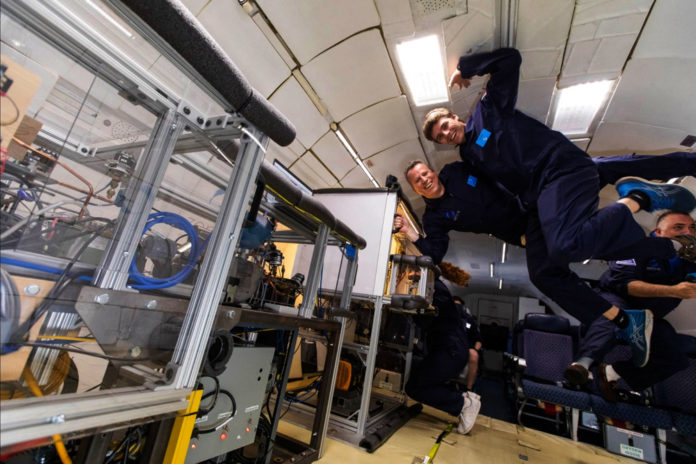One of the biggest challenges in long-term space exploration is a food source for astronauts. While astronauts have been going to space since 1961, the way food is stored hasn’t changed much. They still don’t have a refrigerator to use for keeping food cold on long missions to the moon or Mars.
A team of engineers from Purdue University, Air Squared Inc., and Whirlpool Corporation has developed a prototype space fridge designed to work in zero gravity. The research could overcome the challenge engineers have faced in getting a traditional refrigerator to work in space just as well as it does on Earth.
Astronauts currently survive largely on freeze-dried, canned, and dehydrated foods with a shelf life of about three years. The new project, funded by NASA‘s Small Business Innovation Research program, aims to give astronauts a food supply that can last 5 to 6 years.
The team’s prototype is about the size of a microwave and features the oil-free compressor inside, which acts as the heart of the fridge. The fridge design would cool food through a vapor-compression cycle, similar to the process that a typical fridge uses on Earth but without the need for oil. Having an oil-free vapor-compression cycle removes concerns about oil not flowing where it should be in zero gravity.
The team conducted three experiments earlier this month to test aspects of the refrigerator design aboard a specially designed aircraft that flew in microgravity 30 times at 20-second intervals during four separate flights. The aircraft, Zero Gravity Corporation’s (ZERO-G), is the weightless research laboratory of Zero Gravity Corporation and is the only test platform of its kind in the US.
The experiments aimed to test a common hypothesis that pushing refrigerant liquid through a vapor-compression cycle at a higher velocity would reduce the effects of gravity on the fridge’s performance.
“The fact that the refrigeration cycles operated continuously in microgravity during the tests without any apparent problems indicates that our design is a very good start,” said Leon Brendel, a Purdue Ph.D. student in mechanical engineering. “Our first impression is that microgravity does not alter the cycle in ways that we were not aware of when we tested the effects of gravity on the fridge design on the ground by rotating and inclining it.“
The next step may be to send the refrigerator to the International Space Station (ISS). According to scientists, such a device will not only provide the ability to store drinks and frozen meals but also significantly simplify experiments that require a cold environment. The team will be completing data analysis in the coming weeks.
